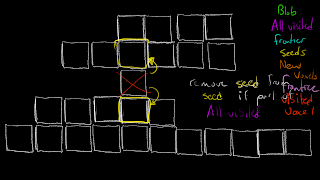For a while now, I've been wanting to learn Cantonese. My first attempts to learn were straight from Jackie. That probably worked for about 5 words, and at least got me introduced to the concept of a tonal language.
But there was only so much I could learn in such an unstructured way. So I purchased a book and CD set for learning Cantonese. Initially, this seemed like a pretty good method. I got through a few chapters, and wrote some of my own notes, and listened to a bunch of the CD tracks. I learned more words and phrases this way. The book was built out of dialogues. And even though dialogues are interesting examples to look at, they feel too set-up to be really useful. It’s like the author was throwing me into the deep end of learning things instead of slowly building the whole process up out of smaller parts. It felt like I was always continuously going back to the books and the audio, to learn on tiny particular things that was in the middle of a large amount of comprehension. It never felt like it would stick. There was so much context switching going on all the time. Trying to break the dialogues into useful chunks that I might want to use; trying to learn what individual words meant; and trying to get the pronunciation of the individual words right. The whole process felt like a jumble, I couldn’t get into the habit of studying.
My ability to learn Cantonese felt like it had stalled, so much effort for so little pay off. But process is always in my mind. Generally I don't like to just plow my way through a problem. I would much rather search around for the weak link in the problem, sharpen my tools to overcome it, and slice the problem into manageable parts.
At first I thought the solution might lie with using something like Rosetta Stone, a software program that is designed to teach language. I don't know much about the details, but I suspected that there must be something to the software that would be more powerful than a book and CD. Unfortunately Rosetta Stone doesn't even have a Cantonese learning package, apparently an audience of something like 80 million native speakers just isn’t enough to make it worth it.
After more searching I found a website called PopupCantonese.com. It is a podcast styled language learning site. And the most important thing I initially liked about the site was how personable the podcasts sounded and felt. The original "Learn Cantonese" books and audio CDs I got felt so completely dead and fabricated that they were a pain to learn from and listen to. Popup Cantonese actually feels like it has real people living in China learning the language, and are having some fun while they do it.
What really sold their website to me was their study tool section that they have. For each episode there is an interactive transcript that allows you to play each word individually, create word study lists, and practice flashcards based on those lists. And the most important feature of all, was an export button that allowed the study list to be made into a simple spreadsheet format that could be input into any learning system I could find.
Just seeing that the export button existed informed me that there must be software available that would import it and help me learn it in some useful way. The software that I found is called Anki (http://ankisrs.net/). It is open source and free (on PCs, android and web, you have to pay for the iPhone version apparently). It is available on every platform and syncs through the web so that all the studying you do with it effortlessly flows between the different places you might study.
The basic concept of Anki is to present a flash card, have you think of the answer, show you the answer, and have you rate your answer on your ability to recall it. Cards that you find difficult will be represented to you again soon, while easy cards will only return at a later date to ensure you memory of them.
The software is fairly advanced and provides a massive amount of control in the creation and presentation of cards. It took me a few days to really get my head wrapped around setting up the cards that I wanted to use, though actually doing the studying is a breeze, just tapping buttons, having you rate your memory ability.
It feels easy to make using Anki everyday a habit. It’s not really a gamified experience, but it has some simple bars that fill up that help show your progress.
So I am heading into learning Cantonese with a very potent process. I’m sure you will hear how I make out in the future.
And a wired article about this approach to memory.
Zoi Gin
Kyler



























































